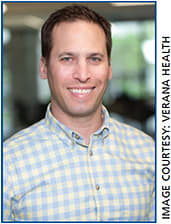Industry Insider is a timely chat with an ophthalmic industry thought leader.
Hylton Kalvaria, senior vice president of commercial and strategic partnerships, joined the company in 2018, after previous leadership roles at Genentech and Flatiron Health.
Ophthalmology Management: Verana Trial Connect facilitates meetings between doctors and potential trial patients. Explain the need for this service.
Hylton Kalvaria: The premise behind Verana Trial Connect is to help physicians gain more out of the data they are already putting into the IRIS Registry. To that end, Verana Trial Connect can help them better sort through hundreds of potential trial patients in their practice, using data pulled from the IRIS Registry.
Instead of, for instance, combing through 1,000 patients, Verana Trial Connect can present them with 20 who have the highest likelihood of meeting the trial’s specific participation criteria. By helping lessen that workflow burden, Verana Health enables physicians and staff to spend more time on patient care.
OM: Why is it important for Verana to help facilitate testing and counseling for patients with inherited retinal diseases?
HK: The introduction to the market of Luxturna (Spark Therapeutics), a gene therapy for inherited retinal diseases, has brought with it a new emphasis on definitive genomic tests for patients. Genetic testing can be very expensive and cumbersome to conduct, further limiting patient access; this is true across medical specialties. Without testing, there is no definitive way to determine if a potential patient is a good match for a treatment.
To help alleviate that, we have partnered with life sciences companies interested in assisting those underserved patient populations. We help offset testing costs completely by working with these companies, which have an interest in finding patients with genetic mutations that could make them a good candidate for ongoing clinical trials.
OM: What is Verana Practice Insights, and how can it be used to help physicians improve their practices?
HK: As with Verana Trial Connect, the underlying principle of our work is to help physicians who contribute to the IRIS Registry get more from their own data. The first module for Verana Practice Insights, which we released in October, helps track information on cataract surgery. Modules to track data for categories such as retinal disease and glaucoma will follow later this year.
Currently, this product allows physicians to compare their own practice patterns for cataract surgery against anonymized data from fellow ophthalmologists. This includes information such as number of patients seen per day, types of imaging used and, most importantly, patient outcomes.
We’ve found that it’s difficult for physicians and practices to really access even basic information about their practice patterns, and we think we can help a lot by curating that data beforehand.
OM: Verana’s products and services revolve around databases, including the IRIS Registry. How do you think the field of data collection will change the field of medicine over the next several years?
HK: EHR data is the perfect starting point to understand really deep clinical questions; however, we also know that such data is not the complete picture. As medical research becomes more granular, it’s important to be able to add and expand onto EHR records. This could mean integrating information such as claims data and prescription data into EHR, all to better inform medical research by creating a clearer picture of the patient journey.
One reason there’s such an emphasis on real-world evidence right now is because clinical trials are expensive and time consuming — even to answer questions where the answer could be knowable from existing real-world experience. However, with resources like the IRIS Registry, we can derive insights from collective experience. These insights can accelerate medical research, so that there may be a day when we no longer need to conduct, for instance, a 3-year trial to understand the effects of a surgical procedure on a certain type of patient. Instead, we will be able to simply examine the data on those patients that have already been collected by our community of doctors. And from there, that underlying data will ultimately lead to better treatments and patient care. OM









